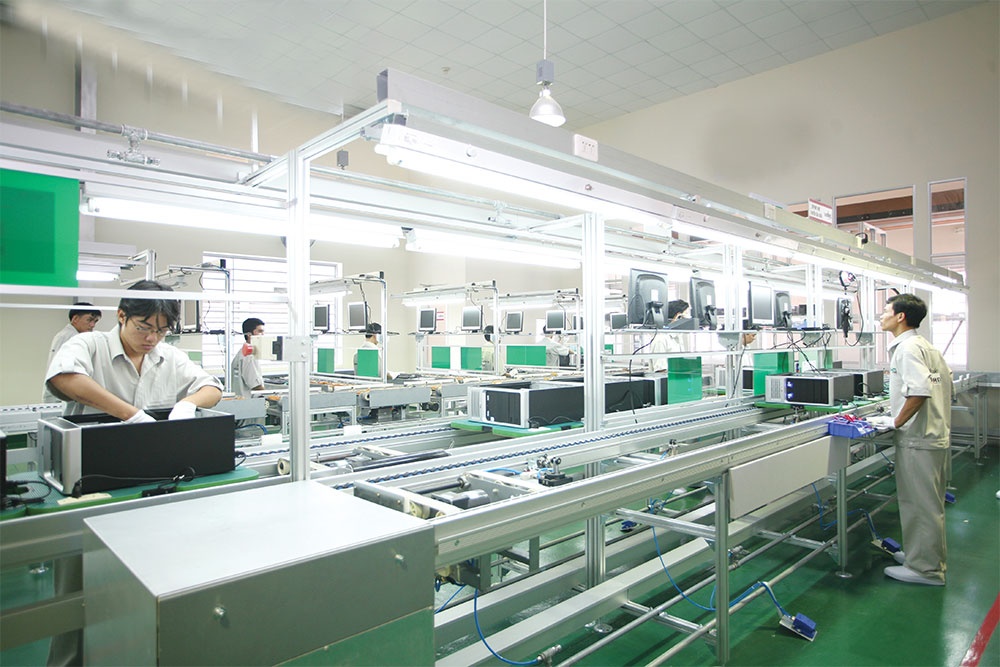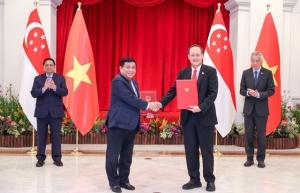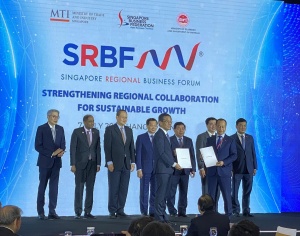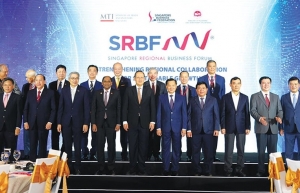Singaporeans exploring all avenues
In mid-July, Vietnam’s healthcare market saw a huge transaction worth $381.4 million between SGX Mainboard-listed healthcare group Thomson Medical Group (TMG) and FV Hospital.
The deal will enable TMG to expand its footprint as it acquires all of Far East Medical Vietnam Ltd., which operates a range of healthcare facilities in Vietnam, including FV Hospital and a network of primary and specialist clinics.
Kiat Lim, executive vice-chairman of Thomson Medical Group told VIR, “Our investment into FV Hospital expands TMG’s presence across Southeast Asia and unlocks the tremendous potential of Vietnam’s growing private healthcare market. Vietnam is one of the fastest growing economies in Southeast Asia, driven by strong inflows of foreign investment, a rising middle class, and its steady progression to becoming a high-income country by 2045.”
 |
| Singaporeans exploring all avenues, illustration photo |
Several Singaporean groups are targeting Vietnam’s burgeoning healthcare market, where the bigger demand is fuelled by a rising middle-class and ageing population, as well as an expanding expatriate population.
Also in July, SciGen, a biopharmaceutical company founded in Singapore in 1988, signed a strategic partnership with DKSH, a market expansion services provider for companies seeking to grow their business, to supply the cancer drug Zometa to the Vietnamese market.
Dr. Shazli Ahmed Khan, SciGen’s region commercial head for Asia Growth Markets, said, “SciGen is actively exploring expansion opportunities across the Asia region with an objective to enhance access to its portfolio for the people who need it the most. Vietnam is a key market in SciGen’s Asian footprint, and the organisation is committed to partnering with local healthcare organisations to achieve this objective to benefit Vietnamese patients.”
Doctor Anywhere Singapore, which entered Vietnam in 2019, has been striving to create a comprehensive healthcare ecosystem in the country by intensifying cooperating with businesses here such as Bao Minh Insurer, Post and Telecommunication Insurance, and MB Ageas Life Insurance, among others.
Doctor Anywhere is currently one of the largest telemedicine companies in ASEAN. Its mobile app – the core product of the company – has gained about three million users in Singapore, Malaysia, Thailand, Vietnam, and the Philippines. It also aims to open a chain of clinics in Vietnam in the upcoming time.
According to the Singapore Business Federation (SBF), Singapore companies’ interest in expanding into Vietnam remains strong, attracted by the growing middle class domestic market and a strong manufacturing base to support exports. In the future, Vietnam will draw more and more interest from foreign investors, especially in areas such as property, renewable energy, manufacturing, infrastructure, healthcare, and technology.
As shown in the SBF National Business Survey 2022/2023, Vietnam is ranked as one of the top three countries for overseas expansion by Singapore companies in the short term. The key sectors of interest from Singapore companies include manufacturing, infrastructure, wholesale, and retail trade.
One example is the partnership between Singapore’s YCH Group and Vietnam’s T&T Group to develop a smart logistics connectivity infrastructure project in the northern province of Vinh Phuc. The super port, with a cargo capacity of 850,000 TEU, aims to transform cargo handling by air, sea, rail, and road and uplift the manufacturing supply chain in northern Vietnam.
Cindy Lim, CEO of Keppel Infrastructure Holdings Pte Ltd. said, “This is the right time for investors to participate in the energy transformation in the country. We are ready to double our investment in renewable energy development in Vietnam going forward.”
The Singapore Regional Business Forum in early July, with a number of MoUs signed between the two countries focusing on technology, banking and finance, and manufacturing, also reinforced the trend of Singaporean investment in Vietnam.
Kok Ping Soon, CEO of the SBF, said at the forum, “Singapore and Vietnam are exploring partnerships in the digital and green economy. There is much in which Singapore and Vietnam can complement each other in these fields, to address our international and regional interests and commitments.”
This is evidenced by MoUs signed between both countries in the last two years, including on energy cooperation, carbon credits, and the Green-Digital Economic Partnership.
According to the Foreign Investment Agency under Vietnam’s Ministry of Planning and Investment, in the first seven months of 2023, Vietnam attracted over $16 billion worth of foreign investment, up 4.5 per cent on-year. Singapore continued to top foreign investors during the period with nearly $3.64 billion.
Vietnam and Singapore are now entering a new development phase after enjoying a thriving partnership over the past 50 years. Together with potential cooperation in digital and green economy, strong partnership in free trade agreements are expected to enhance bilateral investment.
However, Singaporean companies still have concerns regarding the upcoming global minimum tax regime. Soon of the SBF said, “The proposed implementation of the global corporate tax rate in Vietnam will have implications on both existing and future investments here. It is important that the Vietnamese government take a consultative approach with enterprises and international business chambers to find ways for the country to stay competitive in retaining and attracting foreign investments.”
By improving its business environment and quality of workforce, Soon added, Vietnam will be able to sustain business interest as an investment destination.
Edwin Tan, deputy CEO at Frasers Property Vietnam, added, “As long as the government continues to implement supportive policies and improve clarity, foreign investments will continue to thrive in Vietnam.”
| Ronald Tay - CEO, CapitaLand Development (Vietnam)
The Vietnamese market has shown great potential and resilience in the real estate sector, attracting many foreign investors, especially from Singapore. However, to sustain and increase the capital flow in the future, investors need to have a level playing field where they can invest in a fair and transparent environment and enjoy the benefits of a growing and dynamic market. Therefore, we hope that the Vietnamese government will continue to implement more investor-friendly policies and enhance the clarity and consistency of its regulations, so that investors can stay positive and focused in Vietnam. We have a long-term commitment to Vietnam as one of CapitaLand Development’s core markets. We will focus on the bigger scale projects, especially in the residential and township segments. Aside from deepening our presence in the two major cities of Ho Chi Minh City and Hanoi, where we have established a strong foothold and reputation, we want to venture into the surrounding areas of these cities, such as Binh Duong, Dong Nai, Long An, Bac Ninh, and Haiphong, where we see great potential for growth and development. In line with our strategic direction, Sycamore, our first large-scale residential property located in Binh Duong New City, is expected to cover a total area of 18.9 hectares and comprise over 3,700 freehold units, providing quality homes for about 13,000 residents. In the medium to long term, we also plan to expand to new asset classes, such as industrial and business parks, to cater to the growing demand for these sectors in Vietnam. Yulanda Chung - Head of Sustainability, Institutional Banking Group, DBS Bank
As the largest Singaporean bank with strong focus on sustainability, DBS takes a consistent approach for risk management across the bank, governed by our policies and frameworks for responsible financing. These are benchmarked against international industry best practices, such as the Green Loan Principles and sustainability-linked loan principles, and updated as these principles develop. The largest impact we have is through our lending and financing activities. Therefore, it is critical that we continually strengthen our capabilities to support our clients in their transition, while facilitating sustainable and inclusive growth and prosperity. Our measures of success align with our net-zero commitments and can be broadly categorised into two sets of targets. The first set comprises Scope 3 financed emissions reduction targets across seven sectors, while the second consists of data coverage targets across two sectors. Collectively, these nine sectors – power, oil and gas, automotives, aviation, shipping, steel, real estate, food and agribusiness, and chemicals – cover some of the most carbon-intensive sectors in the real economy, together accounting for the majority of global greenhouse gas emissions. These targets will guide us in assessing the climate risks of our existing and potential borrowers to facilitate engagement and partnership-building with clients on the transition journey. |
 | Vietnam-Singapore trade and investment likely to flourish Is it feasible for Singaporean investors to invest all foreign capital in Vietnam’s market? How much time is required to open a bank account, the duration from preparing the application dossier to obtaining the licence? Is there a faster way to find local business partners? |
 | 12 agreements inked at inaugural overseas edition of SRBF 12 MoUs on sustainability, digitalisation, financial services, and human capital development were signed to deepen collaboration opportunities between Singapore, Vietnam, and the wider region at the Singapore Regional Business Forum on July 7. |
 | Singaporean interest in Vietnam flourishes Singaporean and regional investment in Vietnam is expected to thrive in the months to come, following a number of cooperation agreements and commitments reached by the two governments last week. |
What the stars mean:
★ Poor ★ ★ Promising ★★★ Good ★★★★ Very good ★★★★★ Exceptional
Related Contents
Latest News
More News
- Vietnam, New Zealand seek level-up in ties (February 19, 2026 | 18:06)
- Untapped potential in relations with Indonesia (February 19, 2026 | 17:56)
- German strengths match Vietnamese aspirations (February 19, 2026 | 17:40)
- Kim Long Motor and AOJ Suzhou enter strategic partnership (February 16, 2026 | 13:27)
- Haiphong welcomes long-term Euro investment (February 16, 2026 | 11:31)
- VIFC in Ho Chi Minh City officially launches (February 12, 2026 | 09:00)
- Norfund invests $4 million in Vietnam plastics recycling (February 11, 2026 | 11:51)
- Marico buys 75 per cent of Vietnam skincare startup Skinetiq (February 10, 2026 | 14:44)
- SCIC general director meets with Oman Investment Authority (February 10, 2026 | 14:14)
- G42 and Vietnamese consortium to build national AI infrastructure (February 09, 2026 | 17:32)



 Tag:
Tag:




















 Mobile Version
Mobile Version